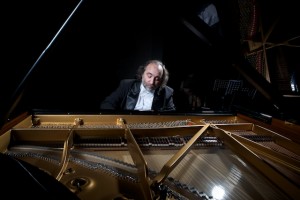In the aftermath of Russia’s nationwide Dec. 10, 2011 protests against violations and alleged fraud at the parliamentary elections, demanding an end to Putin’s 12-year domination of the country, Moscow’s intelligentsia is again making waves.
On Feb. 7, the Russian high-brow Internet pay site “Snob,” owned and published by Mikhail Prokhorov, carried the lengthy article “I Accuse” by Mikhail Arkadiev, an Honored Artist of Russia, a prominent and internationally acclaimed classical pianist, an active composer, and conductor. He has served as the music director of the Russische Abende Chamber Music Festival (Schleswig-Holstein, Germany) and regularly gives Master classes in Moscow, St. Petersburg, Vienna, Budapest, Brussels, and elsewhere.

Published by “Snob” as well as widely discussed on the radio station Ekho Moskvy, Arkadiev’s article is a response to the formation of the so-called “Putin’s Boosters,” i.e., those who expressed their intention to support Vladimir Putin in his upcoming re-election campaign (March 4, 2012). So far 499 signatures of those who have voiced their support appear on the list.
Figuring amongst Putin’s “boosters” who put down their signatures are men and women from social media, prominent dramatists, actors, artists, film directors, world-renowned musicians, composers, and people in the arts and sciences. Among those familiar to Western audiences are such names as those of filmmakers Oleg Tabakov, Nikita Mikhalkov, and Fyodor Bondarchuk, among others. As in art, so in music. Even so respected a classical musician as Yuri Bashmet did not step out of line, throwing off his ideological principles by lending support to the coming of the inevitable dictator.
Of interest also is the fact that on Tuesday, Feb. 14, it became known that the only independent Russian radio station Ekho Moskvy will cease to exist as we know it: the old administration was forcibly replaced by a new one, and the entire editorial staff submitted letters of resignation. In protest to the upcoming new policy changes of going back to controlled, Soviet-style media?
Similar policy changes also have recently affected the editorial staff of “Snob,” possibly in retaliation for a free, uncensored, and unbiased reporting. Former editor in chief, Yakovlev, was let go, others resigned on their own, and the new editor in chief, Uskov, was brought in. With some of the outstanding contributors gone, and others considering to follow suit, it became clear that the magazine will change its unique character, no longer sustain its intellectual independence, and in the end go the way of the politically inert glamor press.
In his article, J’accuse, Arkadiev says, in part, the following:
“I am aware of the fact that what I am going to say will reach only but very few people. But say I must. And what I want to say must be said at this time crucial for the country and only by a classical musician who lives in Russia. …
“I hereby accuse Putin’s regime, which has corrupted our country and which I hold morally responsible for the unconscionable, criminal schism of Russia. This schism was clearly manifest during the two February 4, 2012, Moscow events—the pro-democracy, anti-Putin Bolotnaya Street demonstration and the other, staged by the Putin regime in support of Putin and organized by Putin’s loyalists, on Poklonnaya Street. …”
The Putin regime has got all it takes to win the March 4 election campaign: power apparatus, money, armed to the teeth special police, which will squash any possible display of anti-Putin unrest. One thing Putin’s well-organized reelection campaign desperately needed was the loyal support of the media and the Russian elite, Russian intellectuals. Well, now he seems to have fixed it all: 499 signatures of Russia’s outstanding cultural elite ensure the much needed support to Putin’s reelection by all branches of human endeavor — creative arts, music, literature, film industry, and social media.
Something irreversible is going on in Russia. Destruction of the free, independent press and the rush of the Russian elite to support the inevitable victory of the stealthily totalitarian regime are only an indication.
For a short time, there was hope that more freedom would be won. And indeed, for a while there did seem to be a relaxation. Now things promise to become as bad as ever. The last few decades have seen ever-increasing numbers of Russian businessmen and intellectuals in the West: they are free to travel, take part in joint business ventures and free interchange of ideas, and they know very well what is going on in the world.
Recent months have witnessed signs of revolt. The Russian people are up in arms. The events of Feb. 7 have revealed deep-rooted dissatisfaction with the Putin regime and have set the nation a boil. They showed how unhappy the people are with the political system in their country.
Lev Navrozov can be reached by e-mail at [email protected].

